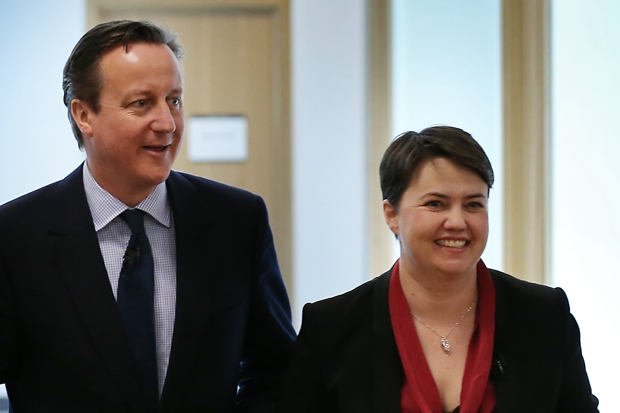With the exception of Gordon Brown – and he was always so dour it was impossible to tell what he was thinking – there hasn’t been a Prime Minister in living memory who has actually enjoyed coming to Scotland.
Margaret Thatcher became spiky and aggressive when she crossed the border – well, more spiky and aggressive than normal. John Major seemed to regard it as a duty he had to endure, while Tony Blair made no pretence about it: he just hated it.
David Cameron, though, has always tried hard when in Scotland. Perhaps, deep down, he would consider it ill-mannered not to be as engaging and courteous as he can be, wherever he goes.
But even Mr Cameron has found it hard to keep that facade alive when in Scotland, particularly as he generally has to run the gauntlet of spittle-flecked nationalist demonstrators everywhere he goes.
Yet something is about to change. The Prime Minister is due to arrive in Scotland later this week, partly to enthuse his Tory troops for the forthcoming election and partly to rally support for staying in the EU. In any other year, this would be a chore for the PM: probably somewhere between root canal treatment and an all-night sitting to resolve fishing quotas.
But, for the first time ever, Mr Cameron can look ahead to his trip over the border with a mixture of enthusiasm and contentment. In fact, Scotland will actually provide a welcome break for him, away from all the sniping and criticism he has to endure from within his own party at Westminster.
There are two reasons for this. The first is that his Scottish party is almost totally united behind his approach to the EU.
The leader of the Scottish Conservatives, Ruth Davidson, is so overtly pro-European that she suggested she would vote to stay in the EU whatever deal the Prime Minister managed to secure. And, of Scotland’s 15 MSPs, only one – the Central Scotland MSP Margaret Mitchell – wants to leave the EU (and even she has hinted that she is open to persuasion).
So, while the Westminster parliamentary party is split down the middle with more than 100 MPs on each side helping to tear the party to pieces, the Scottish party is peacefully united and quite happy to be so.
But then there is the other reason for Prime Ministerial contentment: the Scottish Tories have a chance (it is a modest chance at the moment, but a chance nonetheless) of overtaking Labour for the first time in more than 60 years.
Bread cost a shilling a loaf and you could buy an average suburban house for £1,000 the last time the Tories won more seats and votes than Labour in Scotland. That was in 1955 and there is a feeling that the Conservatives could get back to those heights again this year.
Some polls have put the Conservatives on about the same level as Labour (20 per cent) while some have put Labour four or five points ahead.
So, a gambler would not bet against Labour at this stage but, if the Tories manage to capitalise on the all-important second vote and if Labour supporters waste too many votes on the constituency section – which will be dominated by the SNP – the Conservatives might just do it.
That is a remarkable position for the party to be in and Mr Cameron knows it. He also knows that, in Ms Davidson, he has the most popular Scottish Conservative leader in years. (It is perhaps no surprise that the Tory canvassers are hardly mentioning their party in some parts of the country, merely calling themselves ‘Ruth Davidson’s party’.)
And oh, how the Prime Minister would relish goading Jeremy Corbyn at the dispatch box if the Conservatives finished second and Labour finished third in Scotland this year – a situation which would have been unimaginable just a few years ago.
That is why he can look forward to his visit to Scotland this week; it will be the return to Westminster which will fill him with gloom. How things have changed.






Comments